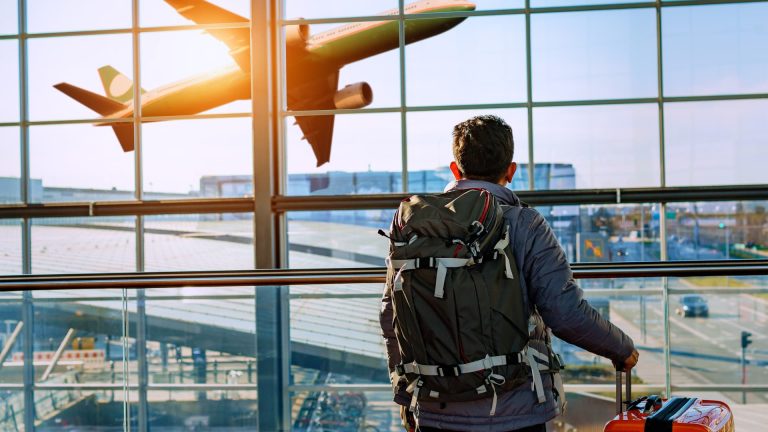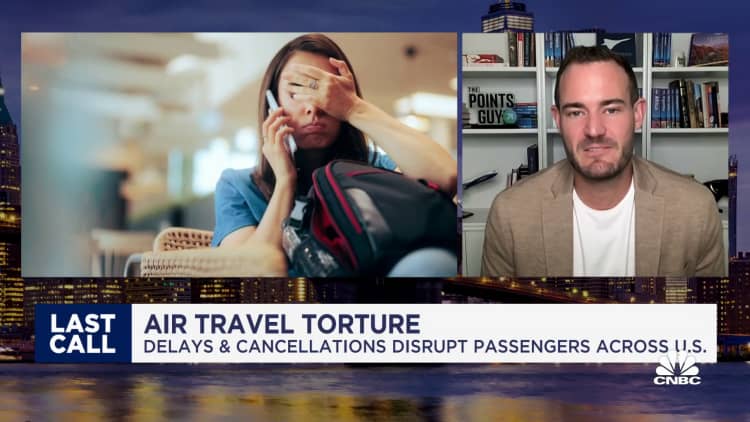
[ad_1]
Natnan Srisuwan | Moment | Getty Images
“Skiplagging” is a money hack for travelers looking to save on airline tickets — but travel experts warn the practice comes with big risks.
Also known as “hidden city ticketing,” the practice is a way to leverage a quirk in airfare pricing.
Here’s the basic concept: Rather than fly nonstop to a desired city, a passenger would instead buy a multi-leg flight with a connection in their desired city. The traveler would disembark at the layover stop instead of flying the final leg.
Sally French, a travel expert at NerdWallet, said travelers would be “surprised” to learn how often skiplagging is cheaper for fliers than buying a direct flight to their end destination.
More from Personal Finance:
How you can save $500 or more on a flight to Europe this year
Canceled or delayed flight? What to know about your rights
U.S. passport delays may be months long
However, the practice also peeves airlines. In fact, many prohibit it — with a varying degree of consequences if a passenger is caught.
Skiplagging has “been around for a while,” said David Slotnick, senior aviation business reporter at The Points Guy.
However, “it’s controversial,” he said.
“I think it reveals a bizarre and counterintuitive way the airline-pricing model works,” Slotnick said. “But in terms of being able to take advantage of that to save money, it’s a super big risk and you probably shouldn’t do it unless you fully understand what you’re doing.”
Consequences include canceled flights, airline bans

It has become easier to engage in the practice due to online travel bookings, including via sites like Skiplagged.com that specialize in such bookings, French said.
Skiplagged.com has a series of frequently asked questions that speak to some of the associated risks, and advice for working around them.
“This is perfectly legal and the savings can be significant, but there are some things to be aware of,” the company said in one FAQ response, adding: “You might upset the airline, so don’t do this often.”
The risks were illustrated earlier this month when a teenager tried using the practice. The teen was scheduled to fly from Gainesville, Florida, to New York, with a stop in Charlotte, North Carolina; instead of disembarking in New York, the passenger planned to do so in Charlotte.
Baona | E+ | Getty Images
The carrier, American Airlines, reportedly discovered the traveler’s intent and canceled their ticket.
In addition to getting a flight canceled — and then having to re-book last-minute, likely erasing any initial cost savings — travelers could get banned from an airline’s frequent-flier program and lose all its accompanying perks, Slotnick said.
Carriers may also ban travelers from flying that airline in the future, he said. They also can theoretically take a traveler to court for damages.
When booking a flight, travelers agree to airlines’ contracts, or conditions of carriage. These contracts set rules for passengers, and often forbid skiplagging (though generally don’t use that specific term), experts said.
American Airlines’ contract, for example, states: “Your ticket is valid only when travel is to/from the cities on your ticket and in your trip record.”
I think it reveals a bizarre and counterintuitive way the airline-pricing model works.
David Slotnick
senior aviation business reporter at The Points Guy
More explicitly, it also prohibits reservations “made to exploit or circumvent fare and ticket rules,” examples of which include: “Purchasing a ticket without intending to fly all flights to gain lower fares (hidden city ticketing).”
United Airline and Orbitz filed a lawsuit against Skiplagged.com’s founder in 2014, but a judge dismissed the case the following year.
Carriers generally don’t like the practice because, for one thing, they can lose revenue. They may have been able to sell an empty seat to another passenger, or perhaps sell a more expensive nonstop ticket to the skiplagging passenger, for example.
Additionally, when travelers deviate from what’s expected it messes with airlines’ internal planning, flight scheduling and data science, for example, Slotnick said.
“They’re not angry that people save $20 on a flight,” he said. “It’s more the predictability in the data set.”
Skiplagging only exists “as a result of airlines’ own pricing schemes,” Dan Gellert, chief operating officer of Skipplagged.com, said in an e-mail.
“Airlines have monopolies on certain hub airports and their pricing reflects that. Thousands of people book Skiplagging or hidden city tickets every day and we generally hear of no issues from any of them,” Gellert said.
There are other risks, inconveniences to skiplagging
Travelers who use hidden city ticketing may be exposed to additional inconveniences. For example, you can’t check your bags, which will go onward to the final destination instead of the connecting city, French said.
Bringing a bag on board as a carry-on is also a gamble: If a plane’s overhead space is full by the time you board, you may be forced to check your bag, French added.
Passengers would also need to book separate one-way tickets. That’s because an airline would likely cancel a return ticket if you were a no-show for any leg of your flight, experts said.
Additionally, flight schedules are “very unpredictable,” French said. Airlines may opt to reroute your flight through a different city — meaning your layover destination (where you’d intended to go) could change.
“There are plenty of [other] ways to find good deals on flights,” especially for travelers willing to be flexible on trip timing and location, French said. Alternatives include using services like Google Explore and Going, which allow consumers to set flight alerts, she said.
[ad_2]
Source link